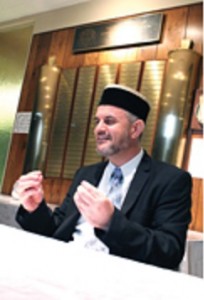Let me begin with my usual disclaimers: I’m not a Rabbanite Jew. I don’t really take sides in the internal debates within the Rabbinic community. But, given the recent attention on the Open Orthodoxy Movement and its fervent desire to ordain female rabbis within the Orthodox Community – as well as the strong opposition by others who will not accept female rabbis, I thought I’d chime in with some Karaite thoughts.
Category Archives: Moetzet Hachamim (Council of Sages)
Karaite Studies: The State of the Field (Part II)
 This is the second (and, for now, final) post related to the Karaite Studies: The State of the Field workshop held in Israel in early 2012.
This is the second (and, for now, final) post related to the Karaite Studies: The State of the Field workshop held in Israel in early 2012.
In this post, we’re picking up where we left off by summarizing and annotating the second half of a question-and-answer session between Rabbi Moshe Firrouz, the Chief Rabbi of the Karaite Council of Sages, and various attendees at the workshop. Based on the number of views, the post on the first half of the question-and-answer session was a hit, and YouTube has a video of the entire session.
A little background is necessary before jumping into this post. A lot questions relate to ritual purity. Karaites generally concern themselves with ritual purity more so than Rabbanites because the traditional Karaite view is that one may not enter a holy place (such as, in the Karaite tradition, the sanctuary of a synagogue) while ritually impure. We’ll discuss this issue in more detail in a later post. Other topics in this post relate to Karaite butcher shops, mikvehs, fertility, and even the permissibility of pets.
Filed under Crimea, Daniel Lasker, Fertility, Free Will, Full Prostration, Head Coverings, Karaite Rabbanite Relations, Marriages, Menstruation, Mikveh, Moetzet Hachamim (Council of Sages), Moshe Firrouz, Mourning, Pets, Prayer, Ritual Purity, Sacrifice, Secular Karaism, What is Karaite Judaism, Women in Karaism
Karaite Studies: The State of the Field (Part I)
 One of my professed goals for starting A Blue Thread is to promote the study of Karaite Judaism at secular and religious institutions. This is the first in a series of posts related to a workshop, entitled Karaite Studies: The State of Field, that was held in Israel from February 27, 2012 – March 1, 2012.*
One of my professed goals for starting A Blue Thread is to promote the study of Karaite Judaism at secular and religious institutions. This is the first in a series of posts related to a workshop, entitled Karaite Studies: The State of Field, that was held in Israel from February 27, 2012 – March 1, 2012.*
For today, I’ve created cliff notes and commentary (not to be confused with an oral law) for the first half of a question-and-answer session between Rabbi Moshe Firrouz, the Chief Rabbi of the Karaite Council of Sages (Hebrew: Moetzet HaHachamim), and various researchers and academics in attendance at the workshop. The topics covered in this post range from women in Karaite Judaism; Karaite Torah scrolls; rebuilding the Temple in Jerusalem; and efforts of the Karaite community to maintain its halakha (religious interpretations), culture and traditions.


